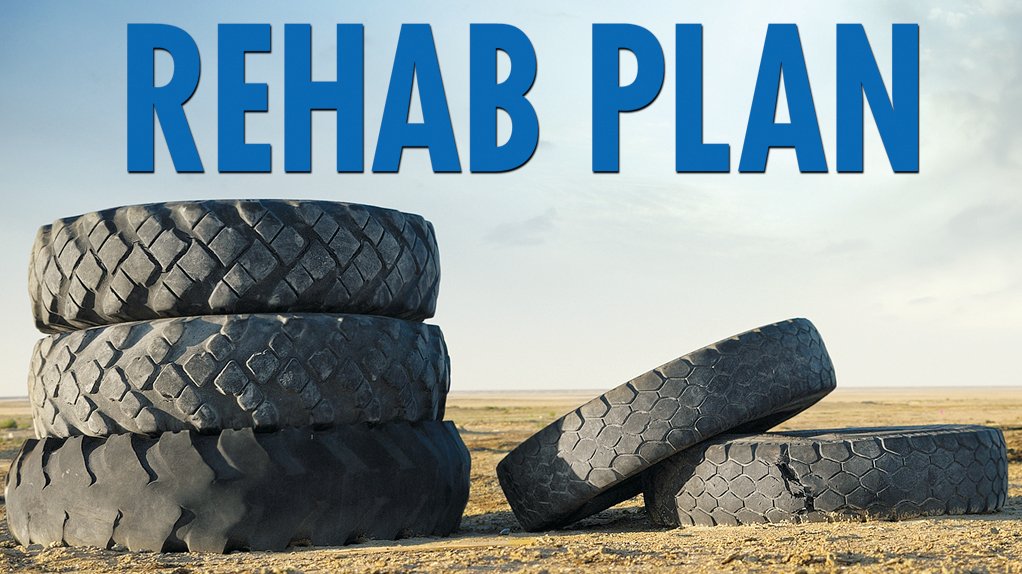Following legal spat, waste tyre management plan moves into implementation
A national plan to use a levy of R2.30/kg on tyres produced or imported to create an effective waste tyre recycling industry in South Africa has been approved by the Supreme Court of Appeal, says Department of Environmental Affairs chief director of communications Albi Modise.
“The Recycling and Economic Development Initiative of South Africa’s (Redisa’s) Integrated Industry Waste Tyre Management Plan (IIWTMP) has been approved and will be implemented soon. The court cases have had an impact on the speed at which the implementation could have happened, but Redisa is starting implementation of the plan this year,” he says.
The Supreme Court of Appeal, in May, found in favour of Environmental Affairs Minister Edna Molewa and Redisa to promulgate the IIWTMP, dismissing with costs the case brought by industry body the Retail Motor Industry.
Redisa CEO Hermann Erdmann says that the levy is a rehabilitation fee, which is necessary to deal with decades of waste tyre build-up and to develop the transportation networks and recycling centres needed to deal with historical waste tyres and new arisings.
“This levy for recycling and waste management is not a new concept and is similar to the concept of the funds set aside to rehabilitate mines after their productive life cycles have ended.
“South Africa has had decades of ineffective waste management and Redisa believes that the IIWTMP is the first step in establishing recycling networks similar to those in most developed and large developing economies.
“The Supreme Court of Appeal judgment thoroughly tested the principles of the Redisa plan and found them to be sound. The judgment referred to the importance of waste management plans to give force to the fundamental Constitutional right ‘to an environment that is not harmful to the health or wellbeing of citizens’, which is at the heart of the Redisa plan,” he says.
The levy will result in a 5 kg tyre costing about R11.50 more, excluding value-added tax, which is 1.15% to 2% of the total cost of a new standard passenger vehicle tyre, if the costs are passed on directly to the consumer.
Producers and importers paying the levy on tyres should understand that the levy is necessary to manage the waste generated by the commercially viable product, he highlights.
“There would be no waste without the production of tyres and, thus, producers and importers must understand that they can play a significant role in combating and managing the waste generated from the use of their products.”
Further, Erdmann highlights that managing waste tyre streams can be effectively achieved by reversing the same distribution chains used in tyre supply chains.
“The first mile of tyre recycling is already done, as consumers take their old tyres back to the supplier when having new tyres fitted. This first-stage involvement of consumers in recycling also serves to illustrate how con- sumers, producers and a recycling industry can be integrated to recycle tyres in South Africa.
“The general public pays for the lack of waste management and recycling every day in the form of health costs and poor living conditions caused by excessive waste. Imposing the levy brings home to producers the need to include the cost for waste management and recycling as part of the production of products that have a negative impact on the health and wellbeing of citizens if not properly managed,” he highlights.
“Waste tyres, as with any other waste stream, are a result of human activity and the way in which modern society conducts itself. Landfill space is shrinking and if we do not change the way in which we think of and deal with waste, we will soon be buried under the waste that our indiscriminate actions generate,” says Institute of Waste Management South Africa (IWMSA) president Dr Suzan Oelofse.
“The only way in which we are going to effect change is for each individual to reduce the waste that he or she generates and join recycling initiatives. By changing consump-tion patterns, the demand for certain con- sumer goods will change and we may find ourselves in a cleaner, greener South Africa,” she says.
New Industry and Job Creation
“Waste management has historically never been a priority. However, our consumption rates, along with high waste-production rates, require that we start to quantify the impacts of such waste. The good thing about waste management is that, while we address such problems, there are opportunities to be explored that can benefit business and the general public,” says Modise.
Redisa is establishing a network of transporters who are paid a fee based on the weight of the load and the distance that the waste tyres have to be transported to recycling and waste tyre processing centres.
Individuals and small businesses have shown significant interest in wanting to partici- pate in the transportation and recycling of waste tyres in their communities and Redisa commands a base network of more than 3 000 individuals and small businesses interested in participating, says Erdmann.
“Waste management presents a unique opportunity to address the waste manage- ment problem, while also addressing other social ills of our country, such as poverty and inequality. The waste management sector can make a significant contribution towards job creation and small, medium-sized and microenterprise development, while ensuring that we keep South Africa clean and healthy,” says Modise.
The Redisa plan focuses on ways to involve small businesses in local communities and has worked with the South African National Civic Organisation (Sanco) to identify and formalise a network of transporters and to identify potential new recycling plant sites to add to the 13 plants currently in operation, which collectively process 30 000 t, or 10%, of waste tyres a year.
“The Redisa plan entails setting up and managing a national network for the collection and temporary storage of waste tyres and their delivery to recyclers, as well as supporting the development of a waste tyre recycling industry and the secondary industries that will use the products created by the recyclers,” notes Sanco president Ruth Bengu.
“Sanco will create and support cooperatives, help identify and verify suitable individuals to fulfil the roles identified in the Redisa plan and help to drive awareness of the plan,” she highlights.
The Redisa programme focuses on extracting as much commercial value from waste tyres as possible after they have been delivered to the processing centres. South Africa imports rubber dust at R2 400/t, but is not using waste tyres to produce rubber dust and steel on a significant scale.
“Recycling is not economically viable if seen in isolation from the production of the products that become waste. However, if seen in conjunction with the production and efficient use of resources, recycling becomes necessary to maintain competitiveness in an economy,” says Erdmann.
“South Africa has no other option but to implement the waste hierarchy, which entails reducing waste where possible, reusing and recycling waste that cannot be avoided altogether, treating nonrecyclable waste to recover energy and reducing waste volumes and the potential environmental impacts,” says Oelofse.
“Disposal is now the last resort as a waste management option. Industry waste management plans are tools introduced by the Waste Act (No 59 of 2008) to encourage self- regulation in the waste industry. Industry waste management plans, therefore, provide opportunities for industry to work with government to achieve the goals of the Waste Act and the National Waste Management Strategy. Our scarce natural resources need to be protected, and regarding waste as a resource will go a long way towards saving our natural resources,” she highlights.
About R600-million a year will be collected from the producers and importers of 275 000 t of tyres a year. This will be used to fund the transportation and recycling of the waste tyres, while producing rubber dust and steel, besides other products.
“Each of the transporters has to complete three training sessions a year with us and all tyre fitment centres are registered on our database, enabling us to call on a network of local transporters to move waste tyres from the centres to the recycling plants,” says Erdmann.
Further, Erdmann highlights that the network of small businesses can formalise their trade and business opportunities, while also providing a potential transportation network that other businesses can use.
“The formalisation of these small busi- nesses and the references garnered from continuous work for Redisa’s IIWTMP will enable these small businesses to access a wider market for their services and gain exposure to formal business practices and the rigours of formal business in South Africa,” says Erdmann.
Redisa will provide payment within five days of confirmed delivery, he adds.
Waste tyre recycling is one of 38 waste streams identified by the Department of Environmental Affairs to promote recycling and reduce the health and environmental impacts of these waste streams on South Africa, says Modise.
“The Redisa plan can be a model to provide incentives for formal industry to recycle waste – specifically the levy that will be used to establish recycling supply chains and provide funds for the establish- ment and operation of a much-needed recycling industry in South Africa,” enthuses Erdmann.
He highlights that the network of small businesses and local entrepreneurs created by the Redisa plan can function as the backbone for a broader recycling industry in South Africa.
“By using the network created by the Redisa plan, we can add other waste streams to the Redisa transportation network, thereby increasing the efficiencies of our waste management and recycling.”
“Improved waste management and recycling should become part of the normal operation of any business and industry in South Africa. Dialogue between industry and the regulatory authorities needs to be strengthened, as sustainable integrated waste management can only be achieved if we all work together towards the same goal,” says Oelofse.
She warns, however, that different players in the tyre industry do not share the same vision of what a waste tyre management plan should entail.
Comments
Press Office
Announcements
What's On
Subscribe to improve your user experience...
Option 1 (equivalent of R125 a month):
Receive a weekly copy of Creamer Media's Engineering News & Mining Weekly magazine
(print copy for those in South Africa and e-magazine for those outside of South Africa)
Receive daily email newsletters
Access to full search results
Access archive of magazine back copies
Access to Projects in Progress
Access to ONE Research Report of your choice in PDF format
Option 2 (equivalent of R375 a month):
All benefits from Option 1
PLUS
Access to Creamer Media's Research Channel Africa for ALL Research Reports, in PDF format, on various industrial and mining sectors
including Electricity; Water; Energy Transition; Hydrogen; Roads, Rail and Ports; Coal; Gold; Platinum; Battery Metals; etc.
Already a subscriber?
Forgotten your password?
Receive weekly copy of Creamer Media's Engineering News & Mining Weekly magazine (print copy for those in South Africa and e-magazine for those outside of South Africa)
➕
Recieve daily email newsletters
➕
Access to full search results
➕
Access archive of magazine back copies
➕
Access to Projects in Progress
➕
Access to ONE Research Report of your choice in PDF format
RESEARCH CHANNEL AFRICA
R4500 (equivalent of R375 a month)
SUBSCRIBEAll benefits from Option 1
➕
Access to Creamer Media's Research Channel Africa for ALL Research Reports on various industrial and mining sectors, in PDF format, including on:
Electricity
➕
Water
➕
Energy Transition
➕
Hydrogen
➕
Roads, Rail and Ports
➕
Coal
➕
Gold
➕
Platinum
➕
Battery Metals
➕
etc.
Receive all benefits from Option 1 or Option 2 delivered to numerous people at your company
➕
Multiple User names and Passwords for simultaneous log-ins
➕
Intranet integration access to all in your organisation





















